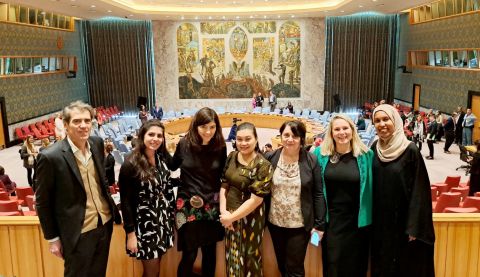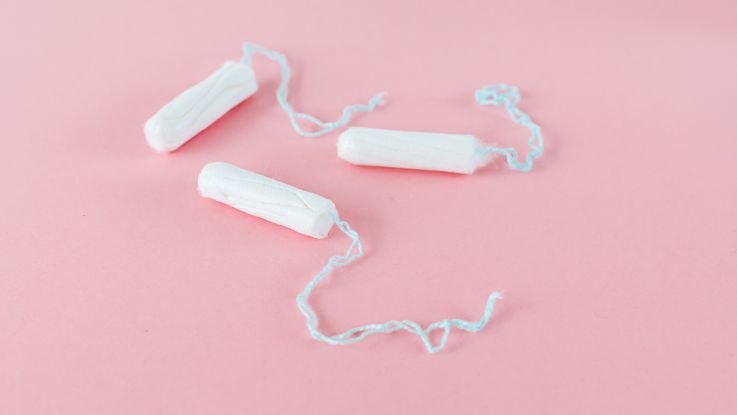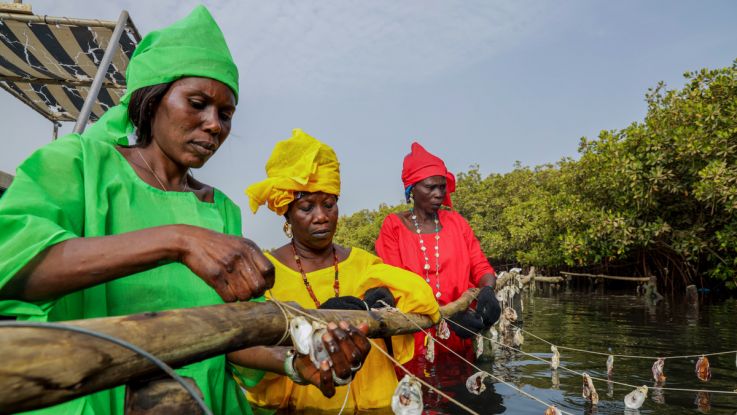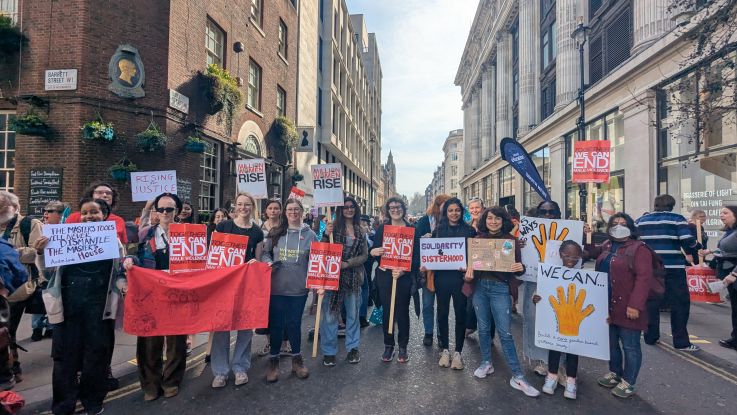Why women's leadership will pave the way for progress on women's peace and security
31 October 2022
On the anniversary of UN's resolution on women, peace and security, we explore the crucial role women play in peace negotiations, humanitarian response and redevelopment after conflicts and emergencies.

Women Peace Security delegation including ActionAid staff in New York. Photo: ActionAid
Today is the 22nd Anniversary of the UN Women, Peace and Security Resolution 13251 – a landmark pledge on women's important role in the prevention and response to conflicts, peace negotiations and peacebuilding.
The 1325 resolution recognises that violence, war and humanitarian crises have different and devastating consequences for women and girls, particularly those who are marginalised, and those with intersecting identities like gender, race, class, sexual orientation, and physical ability.
To recommit to women and girls rights to live in peace – governments, UN agencies and non-governmental organisations gather for a Women Peace and Security debate every year to discuss how women and girls can live free from violence and discrimination
This sounds great in theory - but what is the current reality of the women, peace and security debate in today’s environment?
Women and girls living in crises today
This conversation comes at a time of several, intersecting risks for women – we are witnessing an increase of humanitarian crises, violent and acute conflicts, as well as the negative impacts of climate change risks, and turmoil from the effects of the Covid-19 pandemic2 on women and girls.
We are seeing increasing threats around women’s livelihoods in today’s droughts in East Africa, the increase of displaced women and girls in conflict-affected regions, such as the ongoing war in Ukraine and the Rohingya Refugee response in Bangladesh, but also the shrinking space for women right’s defenders, as evident with the death of Masha Amini in Iran.3
Drought, displacement and rising hunger are putting women and girls at increased risk of gender-based violence. In today’s volatile era, we are witnessing increased threats and the deterioration of women’s rights and safety – but what can we do about this?
Women's right to peace and security
The Women, Peace and Security agenda sets out an important framework for women’s rights around the world, demonstrating the need for programmes and policy to have an intersectional, and integrated approach that links discussions around gender and humanitarian action, protection and prevention.
But it hasn't been able to live up to its goal to ensure safety and participation for women and girls across the world, despite it being passed by the United Nations Security Council twenty-two years ago, in 2000.
Women and their organisations continue to be under-represented in decision-making processes, both at national and international levels. UN Women highlight, that as of December 2021, in conflict-affected and post-conflict countries, women’s representation is at a mere 21 percent. In the international space, in 2021, only eight out of 25 peace agreements reached globally included provisions referencing women, girls and gender.
How can we expect to find a solution if we do not involve women, girls and their organisations in these conversations? There is still a long way to go and more can be done.
Women's role in peacebuilding, security, humanitarian and development activities
As a first step, we need to recognise the role that women and their organisations play in promoting and maintaining peace.
Women play a crucial role in supporting their communities – and beyond – to respond to humanitarian needs.
Women have led peace, set up community dialogues and leveraged relationships to understand the needs of their communities. They are rooted in international, national and local understanding of challenges, but also understand the opportunities to respond to these crises, often finding alternative solutions.
This specialist knowledge is undeniably important when assessing needs within different contexts, specifically in today’s unprecedented environment.
Efforts to promote peace without considering gender equality will prove difficult, nor will it be possible to promote gender equality, if this is not considered as a key theme in peacebuilding or humanitarian programming.
Linking gender and humanitarian action with peace and security
To understand these connections, ActionAid has undertaken research on how women’s rights and women-led organisations have steered responses within humanitarian, development and peacebuilding initiatives, and crossed through these divides.
It brings together the experiences of women leaders from organisations and women’s movements in Haiti, Lebanon, Myanmar and Somaliland, who have been affected by and led responses to emergencies in their communities.
Within each context, they interrogated why inequalities occur, exploring the synergies between their work within humanitarian, development, and peacebuilding activities.
This research has brought new insights to the rhetoric, as the international community is still failing to implement approaches that adequately reflect how best to include the women, peace, security agenda within discussions in the humanitarian and development sectors.
Gendered perspectives and conversations on how this affect’s women’s peace and security are still largely missing – despite the clear links throughout.
Read a summary of ActionAid's upcoming report ‘Leading the Way: The Nexus through a Feminist Lens’ which will launch in November 2022 and find out more on ActionAid's participation at WPS week in New York in 2022.
Footnotes
- 1https://www.unwomen.org/en/docs/2000/10/un-security-council-resolution-1325
- 2https://gaps-uk.org/resources/now-and-the-future-pandemics-and-crisis-gender-equality-peace-and-security-in-a-covid-19-world-and-beyond/
- 3Killings or attacks against women human rights defenders are extremely under reported, even despite this, the office of the High Commissioner for Human Rights verified 29 cases of killings of women human rights defenders in 8-affected countries where such data was available in just 2021.



